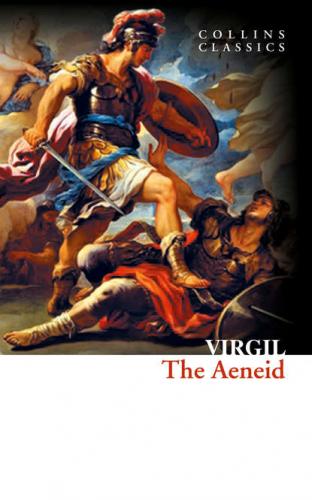Could angry Pallas, with revengeful spleen,
The Grecian navy burn, and drown the men?
She, for the fault of one offending foe,
The bolts of Jove himself presum’d to throw:
With whirlwinds from beneath she toss’d the ship,
And bare expos’d the bosom of the deep;
Then, as an eagle gripes the trembling game,
The wretch, yet hissing with her father’s flame,
She strongly seiz’d, and with a burning wound
Transfix’d, and naked, on a rock she bound.
But I, who walk in awful state above,
The majesty of heav’n, the sister wife of Jove,
For length of years my fruitless force employ
Against the thin remains of ruin’d Troy!
What nations now to Juno’s pow’r will pray,
Or off’rings on my slighted altars lay?”
Thus rag’d the goddess; and, with fury fraught.
The restless regions of the storms she sought,
Where, in a spacious cave of living stone,
The tyrant Aeolus, from his airy throne,
With pow’r imperial curbs the struggling winds,
And sounding tempests in dark prisons binds.
This way and that th’ impatient captives tend,
And, pressing for release, the mountains rend.
High in his hall th’ undaunted monarch stands,
And shakes his scepter, and their rage commands;
Which did he not, their unresisted sway
Would sweep the world before them in their way;
Earth, air, and seas thro’ empty space would roll,
And heav’n would fly before the driving soul.
In fear of this, the Father of the Gods
Confin’d their fury to those dark abodes,
And lock’d ’em safe within, oppress’d with mountain loads;
Impos’d a king, with arbitrary sway,
To loose their fetters, or their force allay.
To whom the suppliant queen her pray’rs address’d,
And thus the tenor of her suit express’d:
“O Aeolus! for to thee the King of Heav’n
The pow’r of tempests and of winds has giv’n;
Thy force alone their fury can restrain,
And smooth the waves, or swell the troubled main-
A race of wand’ring slaves, abhorr’d by me,
With prosp’rous passage cut the Tuscan sea;
To fruitful Italy their course they steer,
And for their vanquish’d gods design new temples there.
Raise all thy winds; with night involve the skies;
Sink or disperse my fatal enemies.
Twice sev’n, the charming daughters of the main,
Around my person wait, and bear my train:
Succeed my wish, and second my design;
The fairest, Deiopeia, shall be thine,
And make thee father of a happy line.”
To this the god: “’Tis yours, O queen, to will
The work which duty binds me to fulfil.
These airy kingdoms, and this wide command,
Are all the presents of your bounteous hand:
Yours is my sov’reign’s grace; and, as your guest,
I sit with gods at their celestial feast;
Raise tempests at your pleasure, or subdue;
Dispose of empire, which I hold from you.”
He said, and hurl’d against the mountain side
His quiv’ring spear, and all the god applied.
The raging winds rush thro’ the hollow wound,
And dance aloft in air, and skim along the ground;
Then, settling on the sea, the surges sweep,
Raise liquid mountains, and disclose the deep.
South, East, and West with mix’d confusion roar,
And roll the foaming billows to the shore.
The cables crack; the sailors’ fearful cries
Ascend; and sable night involves the skies;
And heav’n itself is ravish’d from their eyes.
Loud peals of thunder from the poles ensue;
Then flashing fires the transient light renew;
The face of things a frightful image bears,
And present death in various forms appears.
Struck with unusual fright, the Trojan chief,
With lifted hands and eyes, invokes relief;
And, “Thrice and four times happy those,” he cried,
“That under Ilian walls before their parents died!
Tydides, bravest of the Grecian train!
Why could not I by that strong arm be slain,
And lie by noble Hector on the plain,
Or great Sarpedon, in those bloody fields
Where Simois rolls the bodies and the shields
Of heroes, whose dismember’d hands yet bear
The dart aloft, and clench the pointed spear!”
Thus while the pious prince his fate bewails,
Fierce Boreas drove against his flying sails,
And rent the sheets; the raging billows rise,
And mount the tossing vessels to the skies:
Nor can the shiv’ring oars sustain the blow;
The galley gives her side, and turns her prow;
While those astern, descending down the steep,
Thro’ gaping waves behold the boiling deep.
Three ships were hurried by the southern blast,
And on the secret shelves with fury cast.
Those hidden rocks th’ Ausonian sailors knew:
They call’d them Altars, when they rose in view,
And show’d their spacious backs above the flood.
Three more fierce Eurus, in his angry mood,
Dash’d on the shallows of the moving sand,
And in mid ocean left them moor’d aland.
Orontes’ bark, that bore the Lycian crew,
(A horrid sight!) ev’n in the hero’s view,
From stem to stern by waves was overborne:
The
